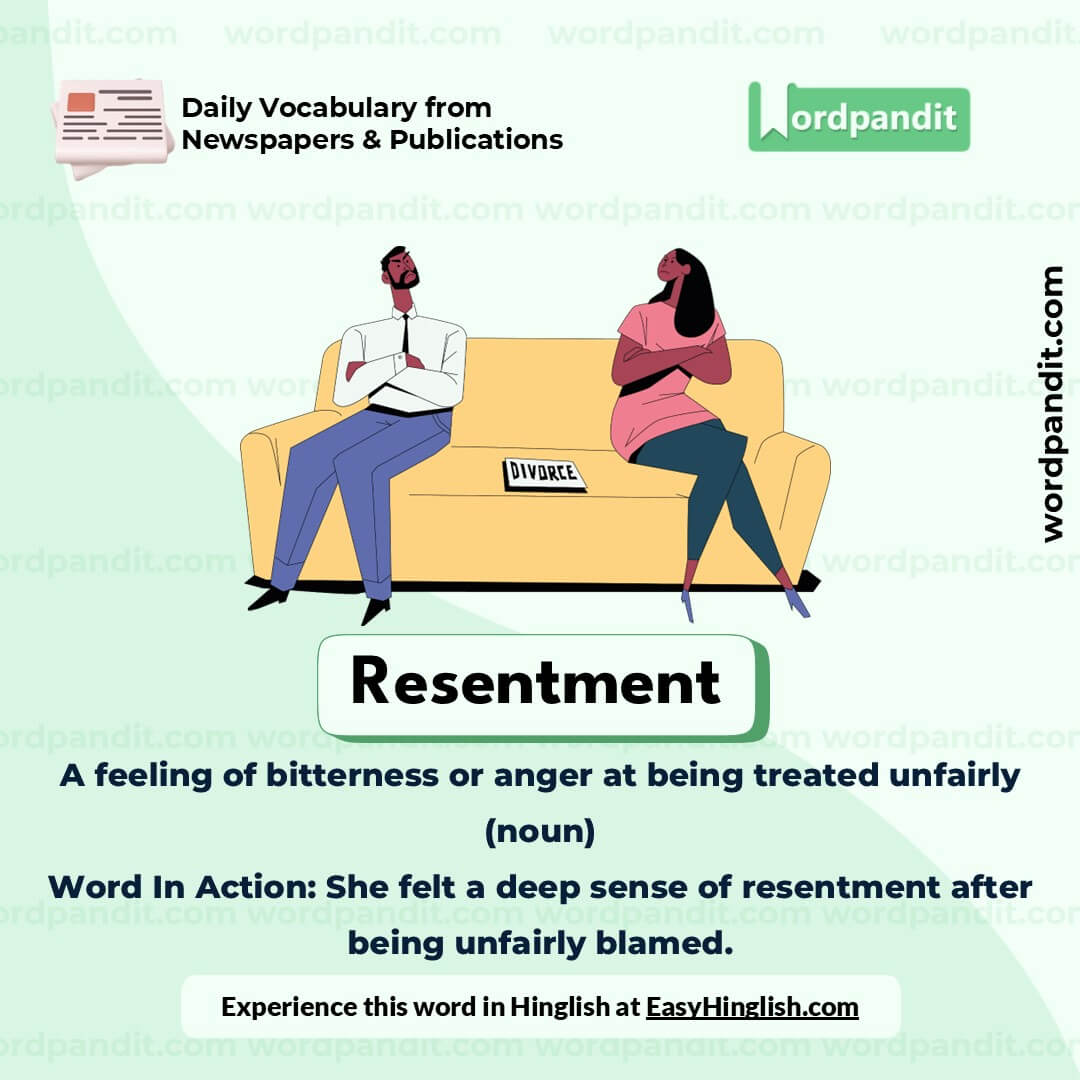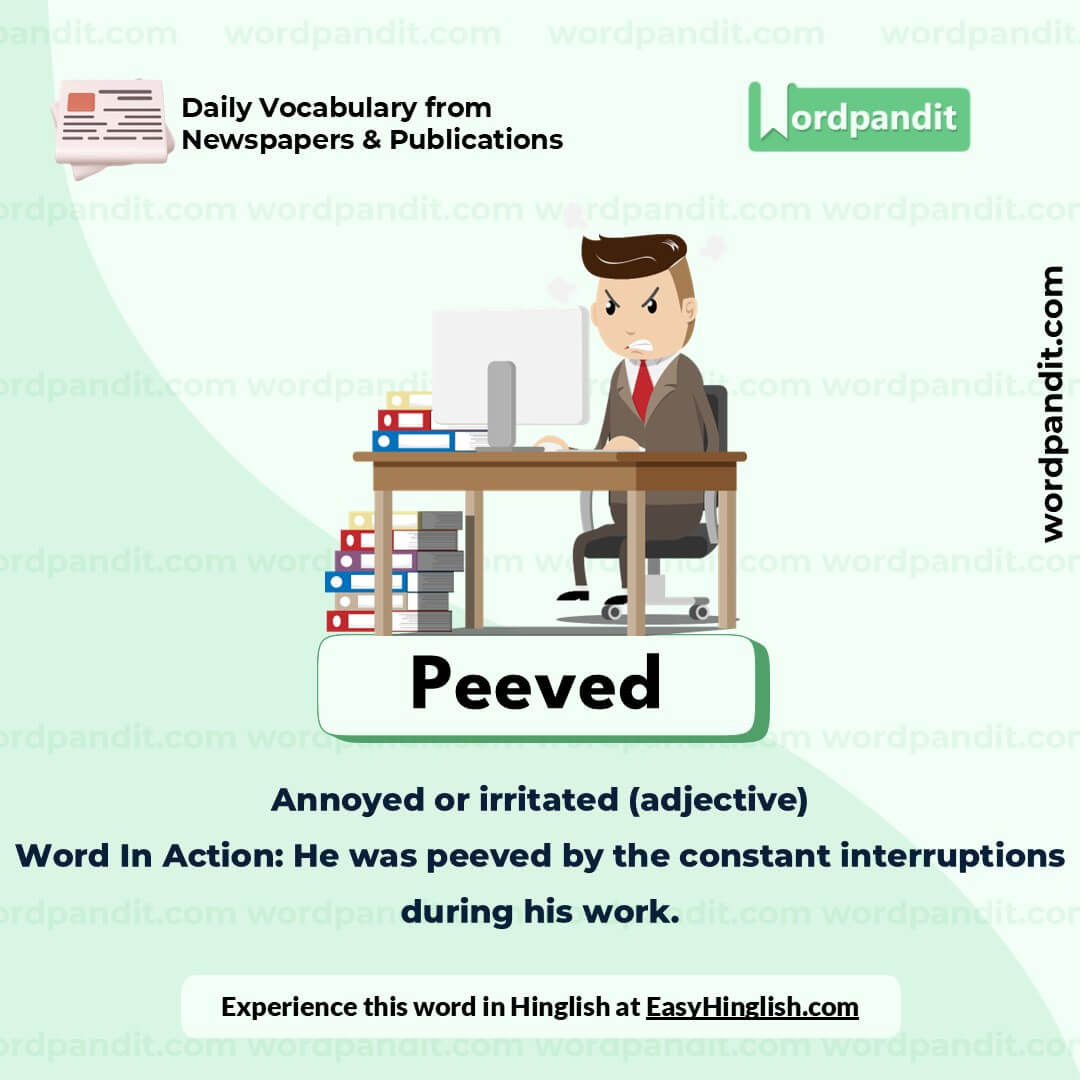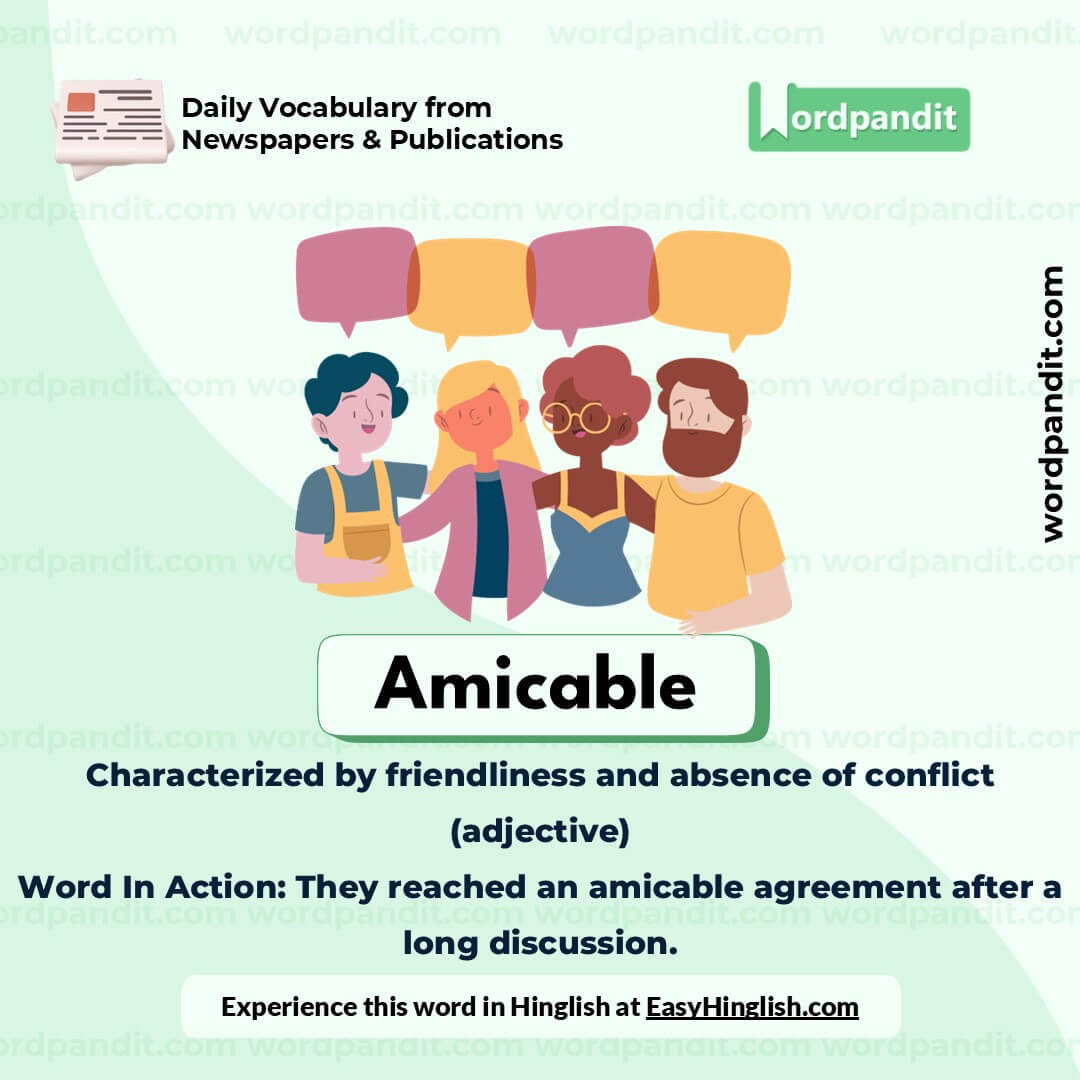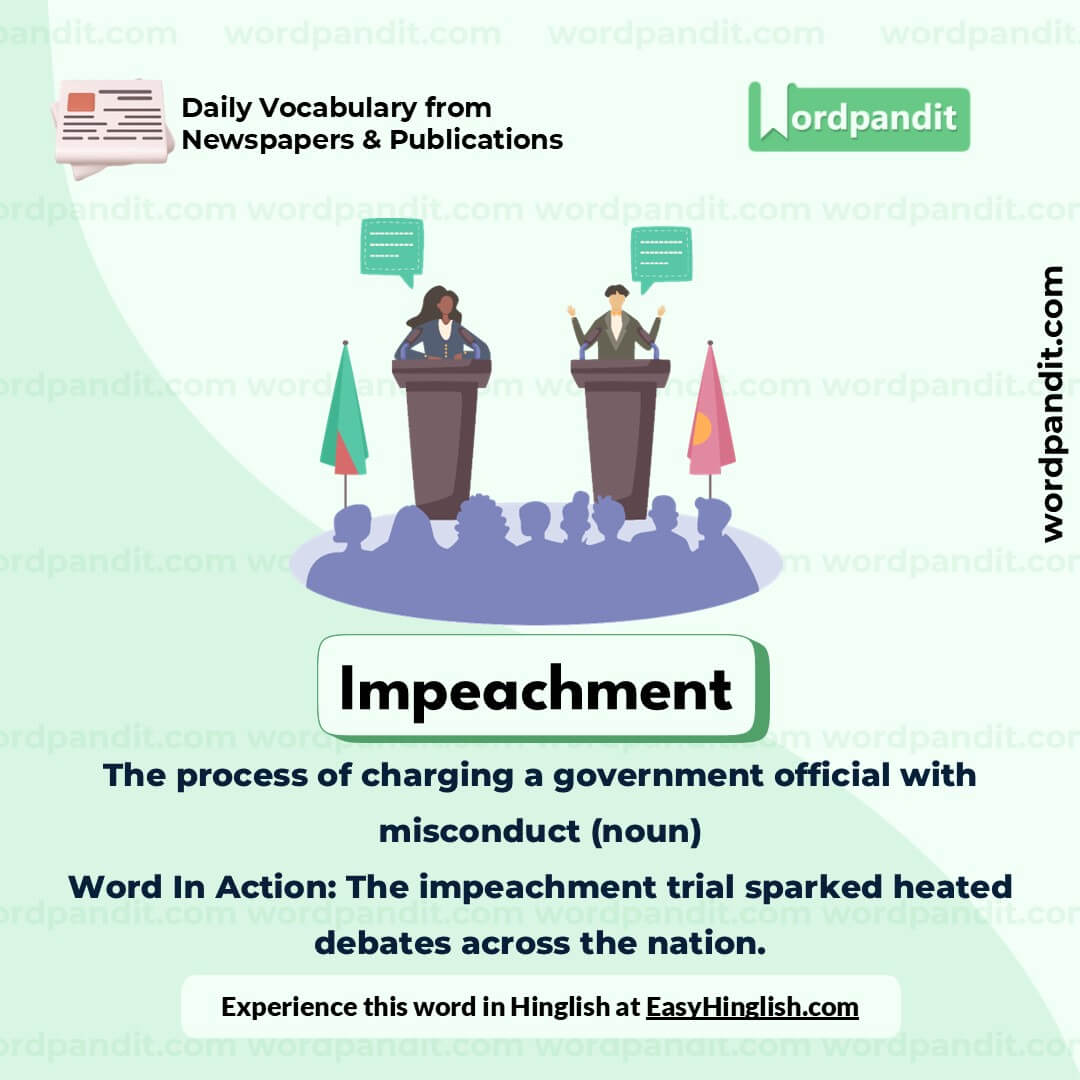Daily Vocabulary from International Newspapers and Publications
Expand Your Vocabulary with Wordpandit’s Global Vocabulary Hub
At Wordpandit, we are committed to helping you develop a truly global vocabulary by drawing from some of the most respected international publications. This section is designed to keep you ahead of the curve by introducing you to words that define global conversations and trends.
The Power of Global Sources
To help you think and communicate on a global scale, we curate vocabulary from renowned international sources, such as:
- The New York Times
- The Washington Post
- BBC
- The Guardian
- The Economist
- Scientific American
- Psychology Today
- And many more...
Stay Global, Stay Competitive
Our daily updates from international publications ensure you are consistently exposed to new words that reflect global news and developments, making sure your vocabulary is not only current but also globally relevant.
Enhance Your Global Perspective
Whether you’re preparing for international exams, aiming to excel in global business communication, or want to enhance your language skills for personal growth, Wordpandit offers the resources you need to thrive in a global context.
Effective Learning, Global Reach
Our learning methodology combines global examples, memory aids, and interactive activities, allowing you to internalize new words effectively and apply them in real-world scenarios.
Begin Your Global Vocabulary Journey Now!
Why Choose Wordpandit?
Practical Learning: Focus on words you'll actually encounter in real-world reading, enhancing your comprehension and communication skills.
Diverse Content: From current affairs to scientific breakthroughs, our varied sources expose you to vocabulary across multiple domains.
Effortless Integration: Make Wordpandit a part of your daily routine. Just a few minutes each day can significantly boost your lexicon over time.
Your Path to Vocabulary Mastery
- Visit our Daily Vocabulary section regularly
- Explore new words and their usage in context
- Practice incorporating these words into your own writing and speech
- Track your progress as your vocabulary expands
Start Your Journey Today
Embark on your vocabulary enhancement journey with Wordpandit. By consistently engaging with our daily posts, you'll build a robust vocabulary that serves you well in academic, professional, and personal contexts.
Remember, a word a day keeps linguistic limitations at bay. Make Wordpandit your daily companion in the quest for vocabulary excellence!
WORD-1: Resentment
Context:
"President-elect Donald J. Trump’s momentary talk of unity on election night may underestimate the depth of his resentment after multiple impeachments, investigations, indictments and lawsuits." - The New York Times
Explanatory Paragraph:
Resentment is the feeling of bitterness or anger that arises when someone perceives that they have been treated unfairly or suffered an injustice. It’s a lingering, often deep-seated, emotional response to a perceived wrong.
Meaning: A feeling of bitterness or anger at being treated unfairly (noun)
Pronunciation: rih-ZENT-muhnt
Difficulty Level: ⭐⭐⭐ (Intermediate)
Etymology: From French ressentir meaning "to feel again" or "feel deeply"
Synonyms & Antonyms:
Synonyms: bitterness, indignation, hostility, animosity, anger
Antonyms: contentment, acceptance, forgiveness, goodwill
Usage Examples:
- She felt deep resentment towards her colleagues who didn’t recognize her hard work.
- The community’s resentment grew as promises of change went unfulfilled.
- His resentment was evident in the way he avoided speaking to his former friend.
- Resentment built up over years, eventually leading to a complete breakdown in their relationship.
Cultural Reference:
"Resentment is like drinking poison and then hoping it will kill your enemies." - Nelson Mandela
Think About It:
How can holding onto resentment impact your well-being, and what might be gained from letting go of it?
Quick Activity:
Reflect on a time when you felt resentment. Write about how it affected your thoughts and actions, and whether you were able to let go of it.
Memory Tip:
Think of "resentment" as "re-sentiment," a feeling that repeats and lingers in the mind as a reminder of a past wrong.
Real-World Application:
Understanding resentment can improve relationships by encouraging open communication and reducing long-held grievances, especially in conflict resolution.
WORD-2: Peeved
Context:
"Peeved at what he called 'fake, untrue, and probably illegal rumors' that he might sell shares of the social media platform that has become a prime source of his wealth, Mr. Trump went online to deny such plans and demanded that those spreading such speculation 'be immediately investigated by the appropriate authorities.'" - The New York Times
Explanatory Paragraph:
When someone is peeved, they’re feeling irritated, annoyed, or somewhat angry, often by something they perceive as unfair or unwarranted. This feeling is typically less intense than anger but is strong enough to cause a reaction.
Meaning: Annoyed or irritated (adjective)
Pronunciation: peevd
Difficulty Level: ⭐⭐ (Beginner)
Etymology: Derived from English dialectal term peevish, meaning irritable or fretful
Synonyms & Antonyms:
Synonyms: annoyed, irritated, upset, bothered, vexed
Antonyms: pleased, content, happy, unbothered
Usage Examples:
- She was peeved when her friends canceled their plans at the last minute.
- The customer was clearly peeved by the slow service at the restaurant.
- He became peeved when he discovered someone had parked in his reserved spot.
- The teacher looked peeved after repeatedly asking the students to quiet down.
Cultural Reference:
"Everyone has a pet peeve — that one little thing that just gets under their skin and makes them peeved." - Common English expression
Think About It:
What minor inconveniences or behaviors typically make you feel peeved? Why do you think they bother you so much?
Quick Activity:
Make a list of your own “pet peeves.” Reflect on why these particular things irritate you.
Memory Tip:
Remember “peeved” by associating it with “pet peeves,” the small things that can cause mild annoyance.
Real-World Application:
The word “peeved” is useful in daily conversations to describe feelings of irritation in a casual, less intense way.
WORD-3: Bereaved
Context:
"Harris and her supporters had tried to counter that by claiming that Trump would also be genocidal and that she would ameliorate the pain of bereaved families in the US by lowering the price of groceries." - Al Jazeera
Explanatory Paragraph:
Bereaved describes individuals who are experiencing deep sorrow due to the loss of a loved one. This word is often used to refer to people who are grieving after a death, emphasizing the emotional pain and sense of loss they feel.
Meaning: Suffering the loss of a loved one (adjective/noun)
Pronunciation: buh-REEVD
Difficulty Level: ⭐⭐⭐ (Intermediate)
Etymology: From Old English bereafian, meaning “to deprive” or “to rob”
Synonyms & Antonyms:
Synonyms: grieving, mourning, sorrowful, heartbroken
Antonyms: joyful, relieved, comforted, consoled
Usage Examples:
- The bereaved family gathered to honor the memory of their loved one.
- Friends visited the bereaved to offer their condolences and support.
- The organization provides counseling to help bereaved individuals cope with their loss.
- He reached out to the bereaved widow, expressing his deepest sympathies.
Cultural Reference:
In many cultures, there are specific mourning practices that the bereaved follow, such as wearing black, holding memorial services, or observing a period of quiet reflection.
Think About It:
How can communities and friends best support the bereaved during their time of mourning?
Quick Activity:
Consider writing a comforting message or letter to someone who is bereaved. What words might help convey your support and sympathy?
Memory Tip:
Remember “bereaved” by associating it with “leave”—when someone has “left,” those who remain feel bereaved.
Real-World Application:
The term “bereaved” is often used in support services, counseling, and community care to refer to people dealing with loss and in need of compassion and support.
WORD-4: Amicable
Context:
"Trump’s call with Zelensky on Wednesday was amicable but comes as officials in Kyiv are anxious about what a Trump presidency might mean for the war effort, said people familiar with the call." - The Washington Post
Explanatory Paragraph:
The word amicable describes a friendly or peaceful interaction, often in situations where there might otherwise be tension. It’s commonly used to depict cordial relationships or negotiations where both parties are cooperative and respectful.
Meaning: Characterized by friendliness and absence of conflict (adjective)
Pronunciation: AM-ih-kuh-buhl
Difficulty Level: ⭐⭐ (Beginner)
Etymology: From Latin amicabilis, meaning "friendly"
Synonyms & Antonyms:
Synonyms: friendly, cordial, harmonious, cooperative, agreeable
Antonyms: hostile, unfriendly, antagonistic, combative
Usage Examples:
- The two companies reached an amicable agreement after lengthy discussions.
- Despite their differences, they managed to part on amicable terms.
- The amicable settlement helped both parties avoid a long court case.
- The neighbors maintained an amicable relationship, often helping each other with yard work.
Cultural Reference:
Amicable divorces, where couples separate on friendly terms, are often portrayed in media as examples of mature and respectful handling of relationships.
Think About It:
Why might it be challenging to maintain an amicable attitude in situations of conflict or disagreement?
Quick Activity:
Think of a recent disagreement. Reflect on how you could have approached it more amicably. Write down a few friendly or diplomatic phrases you could use next time.
Memory Tip:
Remember "amicable" by associating it with "amiable," a word that also conveys friendliness.
Real-World Application:
Using “amicable” is helpful in professional settings when describing cooperative relationships, especially in negotiations or conflict resolution.
WORD-5: Impeachment
Context:
"Control of the House gives a party the power to initiate spending legislation and launch impeachment proceedings against officials." - BBC
Explanatory Paragraph:
Impeachment is the process by which a legislative body, like the House of Representatives, formally accuses a high-ranking official of misconduct. If evidence is found, the official may face a trial and potential removal from office, depending on the country’s legal process. It’s a serious mechanism to hold leaders accountable.
Meaning: The process of charging a government official with misconduct (noun)
Pronunciation: im-PEECH-muhnt
Difficulty Level: ⭐⭐⭐ (Intermediate)
Etymology: From Old French empechement, meaning "to hinder or accuse"
Synonyms & Antonyms:
Synonyms: indictment, accusation, charge, prosecution
Antonyms: acquittal, exoneration, absolution
Usage Examples:
- Many lawmakers called for the impeachment of the official following the scandal.
- Impeachment proceedings began after allegations of corruption surfaced.
- The country’s constitution outlines the conditions for impeachment.
- He faced impeachment but was ultimately cleared of all charges.
Cultural Reference:
In U.S. history, only a few presidents have faced impeachment, including Andrew Johnson, Bill Clinton, and Donald Trump, which sparked national debates.
Think About It:
Why might the power of impeachment be important for maintaining checks and balances in a government?
Quick Activity:
Imagine you are in a governing body. Write a brief statement explaining why you might support or oppose the impeachment of an official.
Memory Tip:
Think of "impeachment" as a process to “impeach” or “impose accountability” on officials who break public trust.
Real-World Application:
The term “impeachment” is significant in legal, political, and historical discussions, especially when discussing accountability of public officials.


















